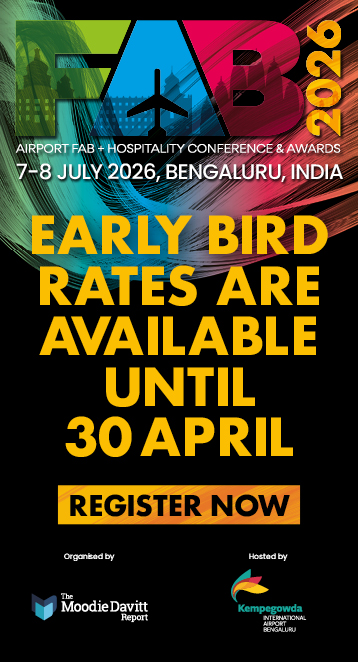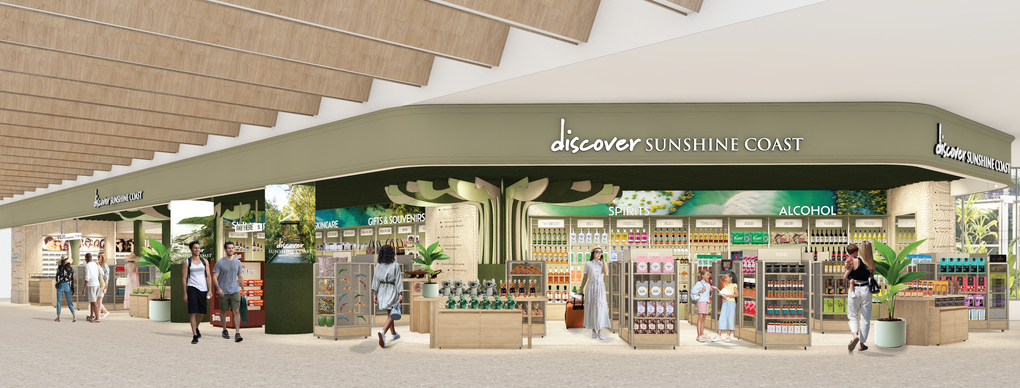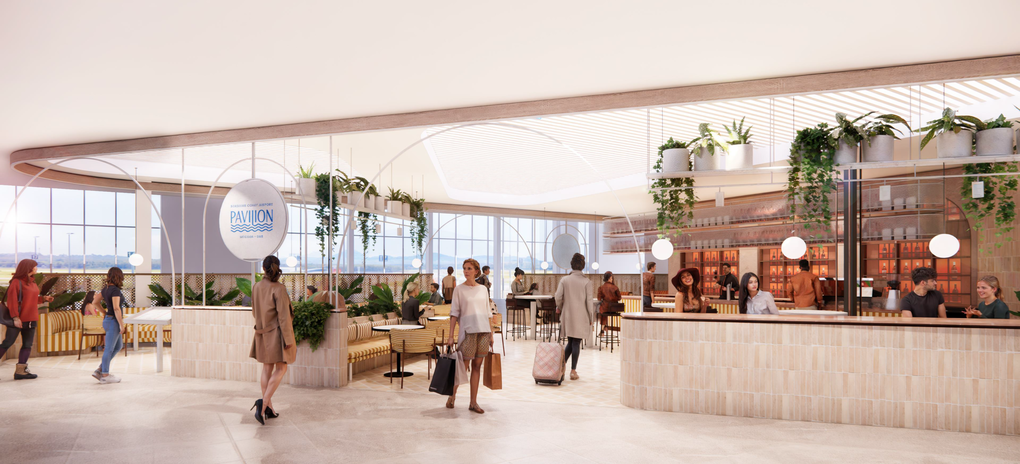SPAIN. While ‘Concepts & Standards’ might not be the most headline-grabbing title for a corporate department, at leading travel dining group Areas it is in many ways the company’s unifying force, and the title neatly embodies a critical series of functions for the €2 billion turnover travel F&B player.
“We like to define ourselves as ‘Operational Corporate’, a very hands-on team of experienced servant leaders, giving active support to the business units to fuel growth, streamline costs and boost reputation,” says Concepts & Standards Worldwide Director Mathieu Herrero. “We also work to align and motivate teams for a single project. It is 100% the ‘Areas Spirit’.”
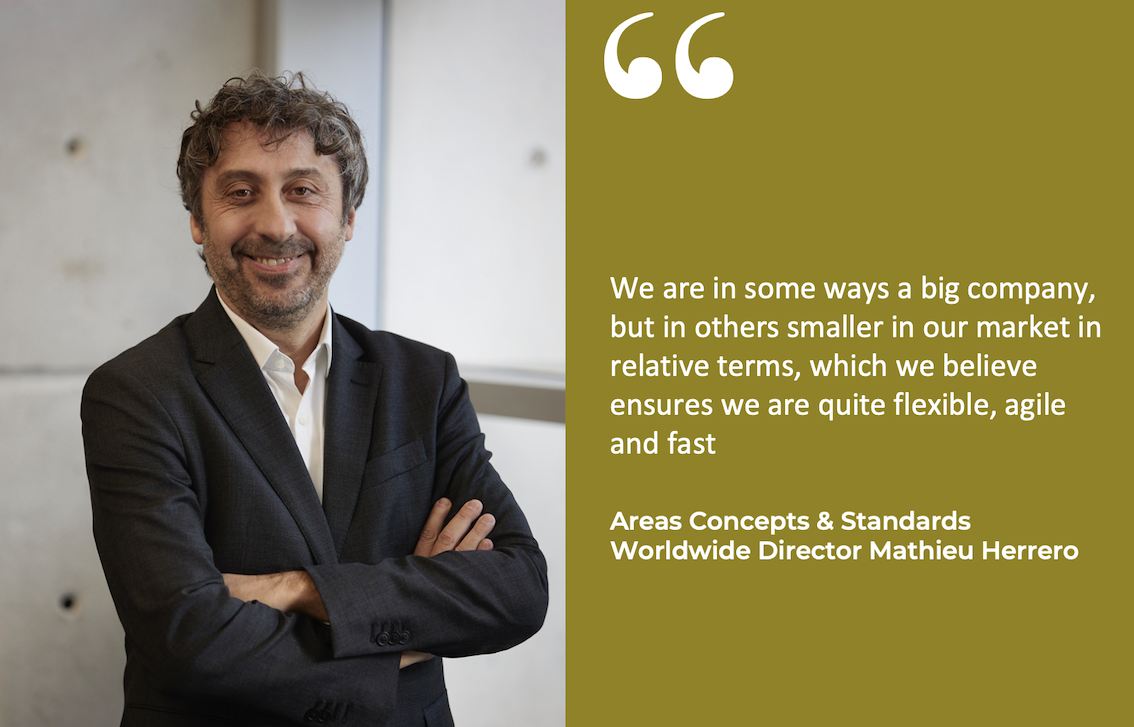
In concrete terms, the work of the department has an impact across the business in four key areas.
It aids growth by supporting business development and in ensuring the portfolio of brands is suitable for each market or airport, via a combination of partner brands, franchised local entrepreneurs plus in-house brands.
It helps optimise the sales effort with marketing and supporting execution in culinary, product range, pricing, campaigns to boost conversion and average ticket values.
It oversees cost control, a vital topic in recent years, including store construction and opex from purchasing to operational overheads.
And it offers corporate functions from market intelligence, leads the ESG strategy and communicates internally and externally to boost recognition of Areas as a brand.
Herrero adds: “Concepts & Standards sets the priorities in these key areas and coordinates the action plans for everybody. Our job is also to ensure everybody is aligned with the strategy and the plan.”
The entrepreneurial spirit
Top of mind over the past year has been the job of repositioning the Areas brand, something that had been planned following the Areas acquisition by PAI Partners in 2019, but whose implementation was pushed out during COVID-19.
“We involved many of our key stakeholders,” says Herrero. “Clearly we have different backgrounds and competitive situations depending on the country we operate in, but doing this exercise we could agree that in every place we shared a kind of entrepreneurial spirit. We are in some ways a big company, but in others smaller than others in our market in relative terms, which we believe ensures we are quite flexible, agile and fast.”
The strategising about Areas’ position led the company to focus on a new claim that it could ‘revitalise the travel hospitality experience’, offering more value to its landlords and customers.
The pillars that make this positioning a reality fall around what the company terms the ‘Areas Spirit’ (summarised in the graphic below). This includes:
- A spirit of belonging with its people, because management wants its teams to feel heard and part of a special project
- A spirit of collaboration with landlords, brands and suppliers
- A spirit of excellence in operations
- And a spirit of responsibility, about making a strong impact in the environment while focusing on people and the future of the industry.
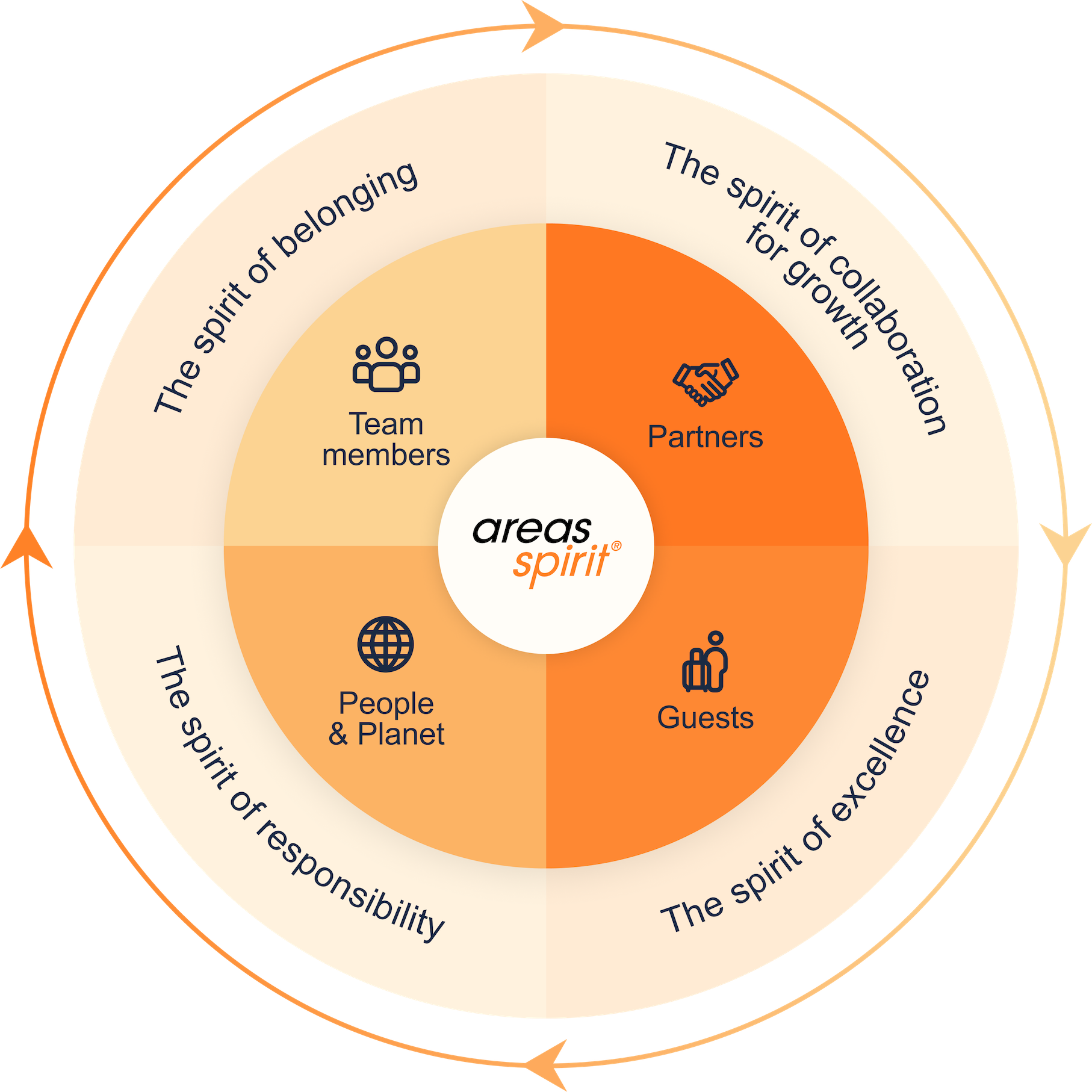
Of this repositioning, Herrero says: “At the start people spoke in different ways, but agreed on the principles. We can say that the spirit is everywhere, and the pillars are everywhere. We have local initiatives but these are overlaid with the pillars.”
People serving people
In an interview with The Moodie Davitt Report last year, CEO Óscar Vela highlighted the ‘Areas Spirit’, noting that “our people are our greatest strength”.
Building on that theme today, Herrero notes that reinforcing the role of people is no casual aside. “People are the basis of our business and our company. We are people serving people.”
What Areas terms the ‘Spirit of belonging’ comes perhaps best to life in the Areas Worldwide Challenge. This annual internal incentive programme aligns and motivates teams in each market, who aim to raise standards – and compete in the programme – across areas such as operational excellence, customer satisfaction, teamwork and achieving exceptional results in sales, cost control and ESG.
As we reported from the 2023 event, months of competition culminate in an event where country winners defend their candidacies along with regional CEOs, and show their talent and dedication to become the ultimate champion.
In the latest edition, in February, Fábio Nunes from Faro Airport in Portugal was declared champion for 2023 (see video below), following in the footsteps of Paola Chavez from Mexico a year earlier and Thibault Barbut and Marion Dejean from France in 2019.
Herrero says: “With our focus on people, the great thing today is that you can go to any market and everyone speaks a similar language. They all talk about their pride in their own country performance, how they can win the Areas Challenge next time, about their initiatives, their selling and lately, how they are tackling cost control.
“You also need to do new things to motivate people – in France or Spain where the Areas Challenge has run for ten years it’s not the same as in other markets where it is new. So we are constantly moving in this area.”
Building the brand strategy
Areas also aims to set itself apart through its brand strategy. Herrero says: “With every tender we go to market with a blend of strong franchises, local entrepreneur brands we have adapted for the market plus our own brands that are adapted to the airport, the motorway or the train station. That’s how we seek to be different.”
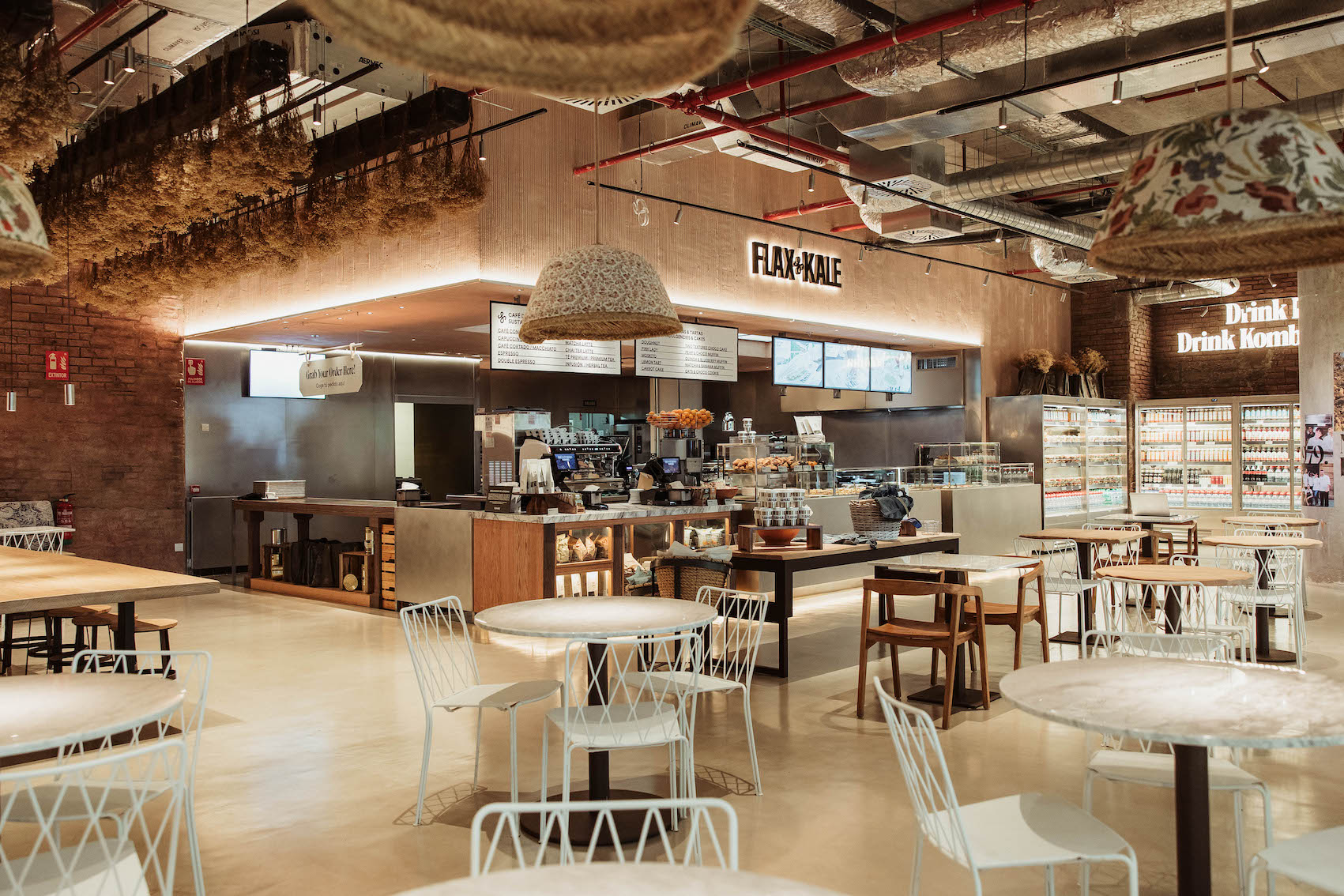
Often the big international franchises will fit high-traffic premium locations, while requirement to deliver Sense of Place and innovation come through local entrepreneurs, without losing what made these brands first appeal to their loyal fans.
Examples include:
- Aix & Terra at Mornas motorway (France)
- Antonino Caravacciolo at Milan Malpensa Airport
- Flax & Kale at Madrid Barajas Airport (pictured above)
- SiP with Cassandra Schaeg at San Diego Airport (below)
- La Cabrera al Paso at Santiago de Chile Airport
- Mercado Providencia at Guadalajara Airport
Areas says it took the time to reimagine how it presents proprietary brands. These have now come to be ‘internal franchises’ with their own brand book, product range and operations standards, and compete for attention as such.
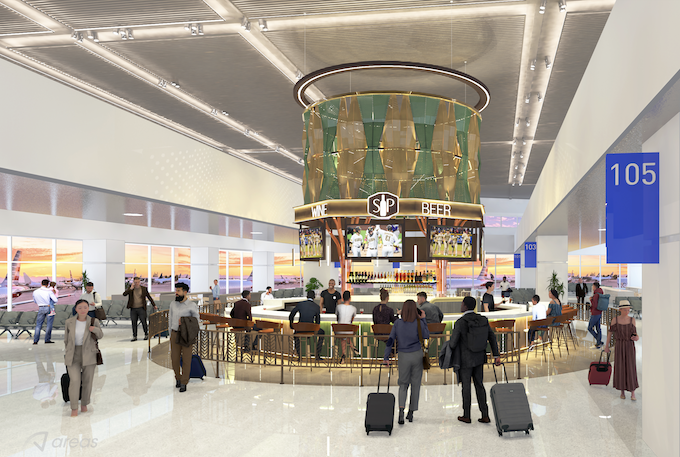
These include VyTA, Farine, Deli&Cia, strEAT and COMO, among others – many recognised down the years through The Moodie Davitt Report-organised Airport Food & Beverage Awards.
Taking advantage of the work it has done in certain categories, Areas is creatively developing these concepts further.
Herrero says: “For example in Italy our teams have created Pizza Flor, a fast and informal Roman-style pizza format now at Milan Malpensa Airport Terminal 1 and Terminal 2, at Florence Airport and soon to be present at San Martino motorway service area.” The goal is to launch this new brand across other business units, advises Herrero.
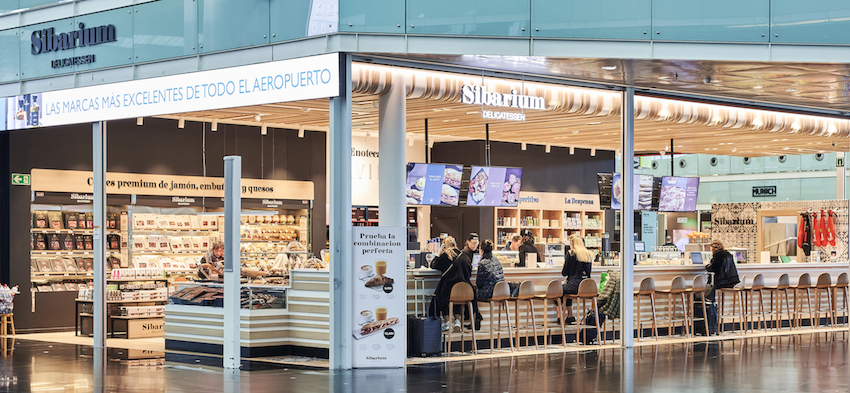
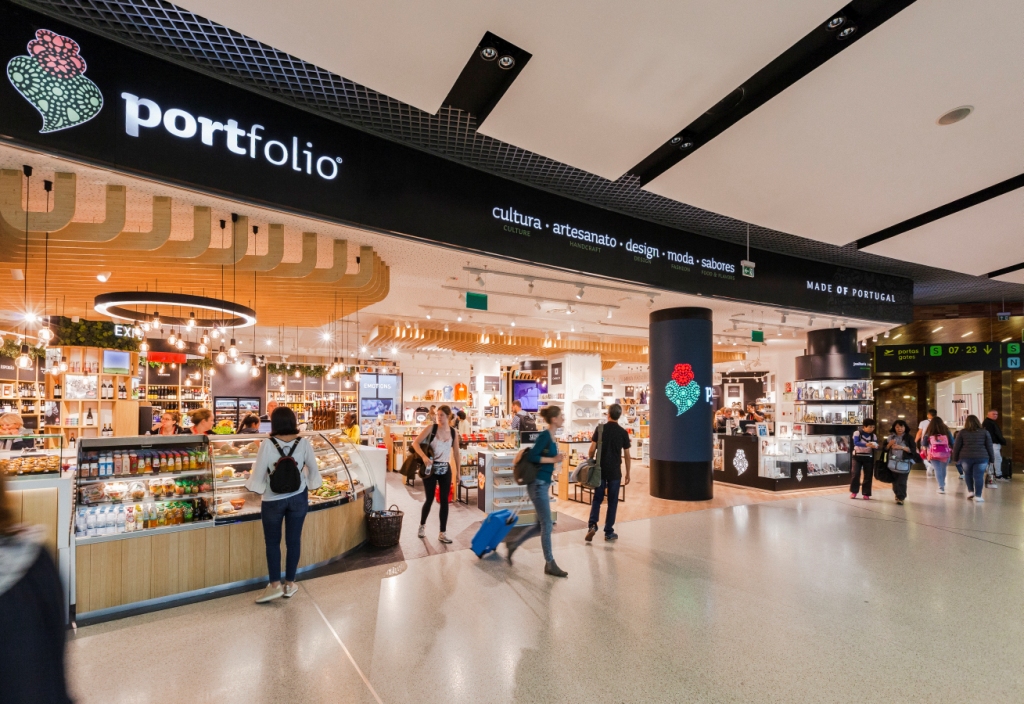
Areas of course also has many years of experience as a speciality retailer, and still manages popular destination ‘food-venience’ concepts such as Sibarium in Spain (eight stores) and Portfolio in Portugal via a JV with airport company ANA. These will remain a core focus.
Culinary first
As we also noted in our previous interview with Óscar Vela, every conversation has to come back to food quality.
“You must be passionate about food and the food experience,” Vela told us. “You would see this if you travel with any of our country directors, talk to them about food, about wine, with their suppliers. We recruit for this passion.”
That comes to life when we discuss the central role of culinary with Herrero, which he describes as the ‘DNA’ of Areas’ brands.
“Our Culinary Teams are responsible for orchestrating and enhancing the value of our food offering; our chefs are working along with marketing and category teams to drive innovation.”
Click above for a recent culinary workshop hosted by Areas chefs
Among owned brands this means aligning with food trends and creating recipes, plus searching out the best ingredients from pizza in Italy to ham sandwiches in Spain, Jambon Brasé in France or tacos in Mexico.
Here, sharing best practice is paramount. Herrero says: “We place a lot of stress on the product. We have reinvented the offer in Italy and are exporting our know-how to other countries across baked, sandwiches, pizza and pasta.”
“We must have chefs who can see each other and exchange ideas about product development and innovation. Our kitchen at our Barcelona headquarters has screens that connect with the rest of the world where we can do this effectively and proactively.”
Importantly, Herrero notes that putting culinary before brand is now a pillar of the strategy because “people want products and experiences first”.
ESG drive: Areas for Change
In the same way as Areas launched the Areas Worldwide Challenge to promote best practices internally, it has also developed Areas for Change as part of the company’s global Environmental, Social and Governance (ESG) strategy.
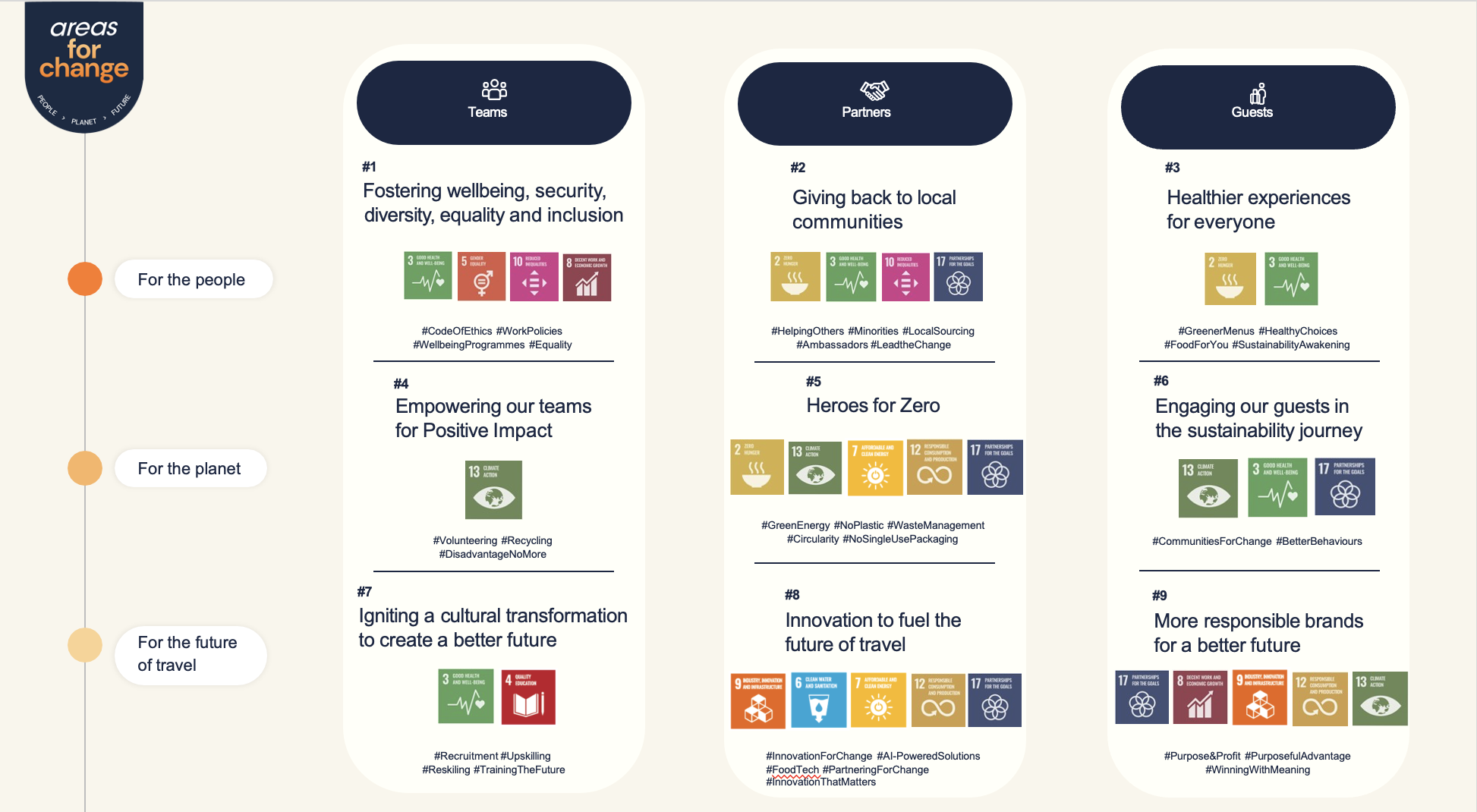
Areas for Change Challenge is aimed at startups with the goal of finding “concrete and feasible solutions that respond to the company’s own challenges for the coming years and those of the F&B and travel retail sector in terms of sustainability”.
This strategy is based on three pillars: People, Planet and the Future of Travel Retail.
It intersects with three key communities: Areas’ teams, partners and guests. The resulting framework involves nine key commitments, through which Areas says it can “significantly influence and make an impact in our industry for the better”.
These are summarised as:
- Fostering Wellbeing, Security, Diversity, Equality and Inclusion
- Giving back to local communities
- Healthier experiences.
- Empowering teams
- Heroes for zero
- Engaging guests in the sustainability journey
- Igniting a cultural transformation
- R&D for the future of travel
- More responsible brands
The combination of these factors, crucially, also feeds into commercial performance.
Herrero says: “We have won many big tenders in recent years and we will reach over €2.1 billion in sales this year. We are seeing strong momentum in traffic growth, and that is better than average in the countries we are operating in.”
This means that the portfolio of existing territories in which Areas plays is sound, with consolidation the name of the game in Europe and room to grow in the US and Mexico in the Americas.
In closing, asked to identify that USP that will help define Areas’ fortunes in the coming years, Herrero says: “What is good for us is that we can apply our entrepreneurial spirit, which is the heartbeat of Areas. We are not just in the travel business, we are crafting transformative experiences guided by expertise and a commitment to a better future.
“This spirit, our Areas Spirit, is ingrained in everything we do, driving us to innovate, lead, and make a positive impact on our team members, partners, guests and, ultimately, the planet and all its people. It is not just what we offer, it is how we offer it, with an entrepreneurial mindset that energises the world towards a brighter future”.
Note: The Moodie Davitt Report publishes the FAB Newsletter, which features highlights of openings, events and campaigns from around the world of airport and travel dining.
Please email Kristyn@MoodieDavittReport.com for your complimentary subscription.




